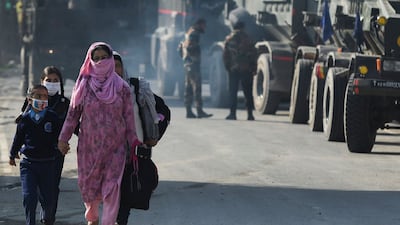New Delhi is considering a phased withdrawal of the army from some districts of Kashmir — the most militarised region in the world — more than three decades after an anti-India armed rebellion broke out in the Himalayan valley.
Prime Minister Narendra Modi’s government reportedly intends to replace the army with paramilitary forces.
However, the army will still be stationed on the Line of Control — the line that divides the disputed region between India and Pakistan, the Indian Express reported.
Mr Modi’s government sent tens of thousands of additional army and paramilitary troops to Kashmir, which already had 500,000 armed personnel stationed there in 2019.
They arrived after India scrapped Article 370 of its constitution, which gave special powers to the restive region. The southern Indian side of Kashmir was subsequently brought under India's direct control.
Since then, India gradually increased its security presence in Kashmir as the arbitrary move led to a sharp increase in armed violence.
At least 44 killings — comprising 19 militants, 13 civilians and 12 members of the armed forces — occurred last year alone.
The Indian Express quoted a source who said the discussion to withdraw the army was at an advanced stage, and involved the federal Defence and Home Affairs ministries and the region's police force.
“The matter is under serious discussion at interministerial level and it is understood to be feasible,” a senior security establishment officer told the Indian Express.
“In a way, the decision has been taken and it is a matter of when it will be done. Ultimately, however, it will be a political call.”
It is proposed that the Central Reserve Police Force, a paramilitary unit, will take up the role of army units removed from the valley, and maintain law and order.
The army and the Central Reserve Police Force did not respond to The National’s requests for comment.
There are 130,000 Indian soldiers in the disputed region, with about 80,000 stationed at the Line of Control. In addition, hundreds of thousands of paramilitary and special police forces are also stationed across the valley.
Mr Modi’s government has claimed that New Delhi’s direct rule has helped bring normality to the region and that his government has done a better job in tackling militants, which it says are funded and supported by Islamabad.
The Kashmir region is ruled by India and Pakistan in part but claimed by both in its entirety since former colonial power Britain left the subcontinent in 1947.
The two countries have fought three wars over the region while a three-decade-long armed insurgency has claimed the lives of tens of thousands of people.
“Since the August 5, 2019 decisions, violence in the valley has steadily reduced,” a Home Ministry official said.
“Stone pelting has almost vanished and the law-and-order situation is largely under control. However, a large presence of the Indian army in the hinterland would sit oddly with claims of normalcy.”
UAE currency: the story behind the money in your pockets
Wicked: For Good
Director: Jon M Chu
Starring: Ariana Grande, Cynthia Erivo, Jonathan Bailey, Jeff Goldblum, Michelle Yeoh, Ethan Slater
Rating: 4/5
White hydrogen: Naturally occurring hydrogen
Chromite: Hard, metallic mineral containing iron oxide and chromium oxide
Ultramafic rocks: Dark-coloured rocks rich in magnesium or iron with very low silica content
Ophiolite: A section of the earth’s crust, which is oceanic in nature that has since been uplifted and exposed on land
Olivine: A commonly occurring magnesium iron silicate mineral that derives its name for its olive-green yellow-green colour
Europe wide
Some of French groups are threatening Friday to continue their journey to Brussels, the capital of Belgium and the European Union, and to meet up with drivers from other countries on Monday.
Belgian authorities joined French police in banning the threatened blockade. A similar lorry cavalcade was planned for Friday in Vienna but cancelled after authorities prohibited it.
DUBAI%20BLING%3A%20EPISODE%201
%3Cp%3E%3Cstrong%3ECreator%3A%20%3C%2Fstrong%3ENetflix%3C%2Fp%3E%0A%3Cp%3E%3Cstrong%3EStars%3A%20%3C%2Fstrong%3EKris%20Fade%2C%20Ebraheem%20Al%20Samadi%2C%20Zeina%20Khoury%3C%2Fp%3E%0A%3Cp%3E%3Cstrong%3ERating%3A%3C%2Fstrong%3E%202%2F5%3C%2Fp%3E%0A
What it means to be a conservationist
Who is Enric Sala?
Enric Sala is an expert on marine conservation and is currently the National Geographic Society's Explorer-in-Residence. His love of the sea started with his childhood in Spain, inspired by the example of the legendary diver Jacques Cousteau. He has been a university professor of Oceanography in the US, as well as working at the Spanish National Council for Scientific Research and is a member of the World Economic Forum’s Global Future Council on Biodiversity and the Bio-Economy. He has dedicated his life to protecting life in the oceans. Enric describes himself as a flexitarian who only eats meat occasionally.
What is biodiversity?
According to the United Nations Environment Programme, all life on earth – including in its forests and oceans – forms a “rich tapestry of interconnecting and interdependent forces”. Biodiversity on earth today is the product of four billion years of evolution and consists of many millions of distinct biological species. The term ‘biodiversity’ is relatively new, popularised since the 1980s and coinciding with an understanding of the growing threats to the natural world including habitat loss, pollution and climate change. The loss of biodiversity itself is dangerous because it contributes to clean, consistent water flows, food security, protection from floods and storms and a stable climate. The natural world can be an ally in combating global climate change but to do so it must be protected. Nations are working to achieve this, including setting targets to be reached by 2020 for the protection of the natural state of 17 per cent of the land and 10 per cent of the oceans. However, these are well short of what is needed, according to experts, with half the land needed to be in a natural state to help avert disaster.
KILLING OF QASSEM SULEIMANI



